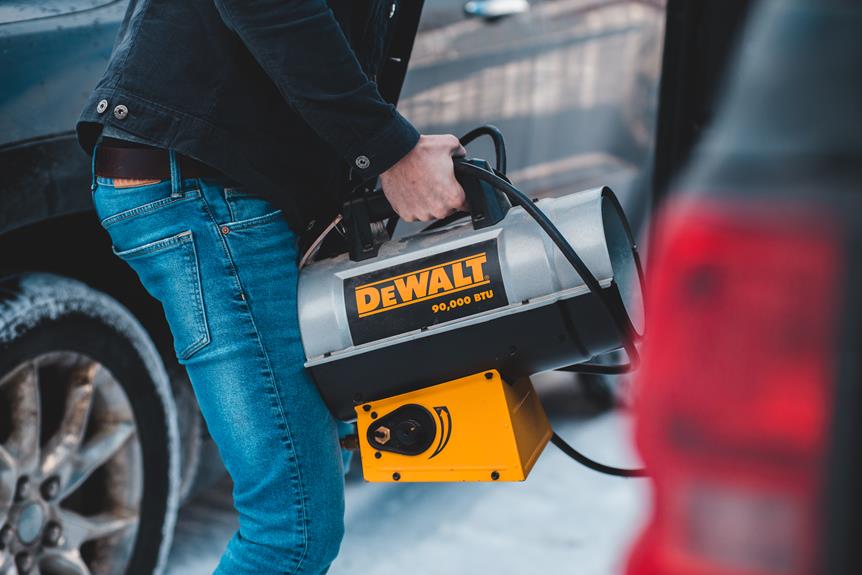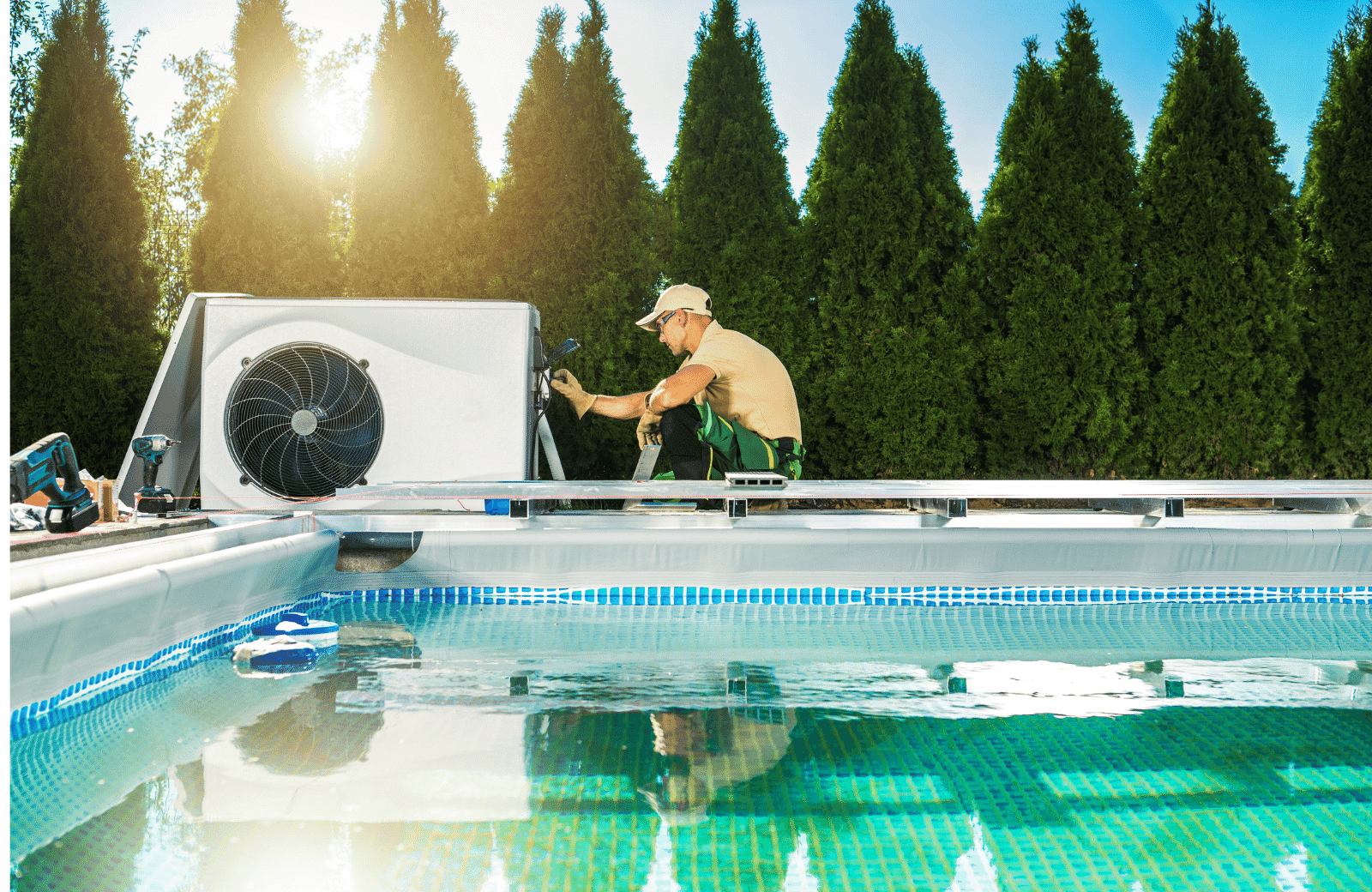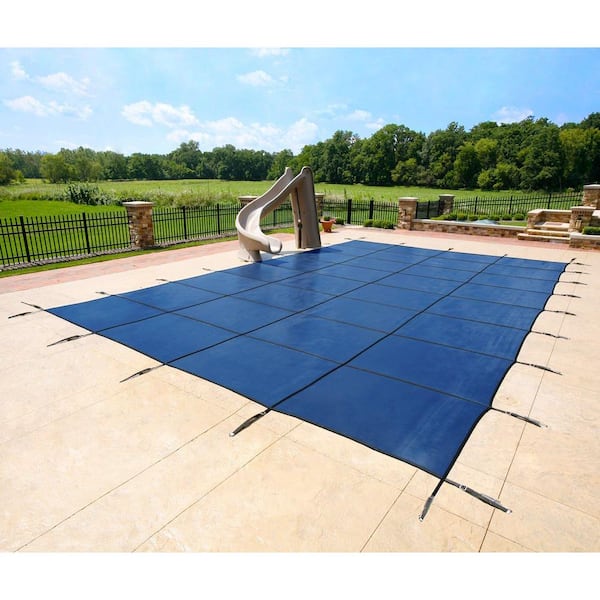Are you ready to protect your pool heater this winter? Did you know that properly winterizing your pool heater can prevent damage and save you money on repairs? In this article, we'll guide you through the steps to winterize your pool heater, from shutting off gas and electricity to draining and disconnecting plumbing. We'll even cover tips for winterizing solar heaters. By following these instructions, you can ensure your pool heater's longevity and optimal performance. Let's get started!
Key Takeaways
- Turn off gas valves, electrical power, pump, and filter before winterizing a pool heater
- Follow specific instructions from the owner's manual and consider hiring a professional if unsure
- Winterizing prevents freezing water damage, extends heater's lifespan, saves energy costs, and protects from debris and animals
- Winterize the pool pump and filter, close and drain return jets, winterize the skimmer, and store pool lights in a warm, dry place.
Shutting off Gas and Electrical Power
To safely shut off the gas and electrical power to your pool heater, turn off the gas valves on the heater and gas line, and then turn off the electrical power and unplug the power lines. It is important to shut off the gas valves to prevent any gas leaks and potential hazards. Before turning the valves, make sure to check for any signs of gas leaks, such as a strong smell of gas or hissing sounds. If you detect any leaks, it is crucial to address them immediately and contact a professional for assistance.
Once the gas valves are turned off, proceed to turn off the electrical power and unplug the power lines. This step ensures that the heater is completely disconnected from any power source and eliminates the risk of electrical accidents. When unplugging the power lines, handle them with care and avoid any contact with water or moisture.
After shutting off the gas and electrical power, it is important to properly store the heater parts. This includes removing any detachable components, such as the control panel or burner assembly, and storing them in a safe and dry place. Make sure to follow the manufacturer's instructions for disassembly and storage. Additionally, cover the heater with a protective cover to shield it from dust, debris, and potential damage during the winter months.
Draining and Disconnecting Plumbing
When draining and disconnecting the plumbing, be sure to follow the specific instructions in your owner's manual. Properly winterizing your pool heater is essential to protect it from freezing temperatures and prevent damage. Here's how to drain and disconnect the plumbing of your pool heater:
| Steps to Winterize a Pool Heater | Tips for Pool Heater Winterization |
|---|---|
| 1. Turn off gas valves on the heater and gas line | – Check your owner's manual for specific instructions |
| 2. Turn off electrical power and unplug power lines | – Start winterizing early |
| 3. Turn off the pump and filter | – Be cautious when working with gas or electricity |
| 4. Turn off the pressure switch if applicable | – Basic tools like a wrench and air compressor are usually sufficient |
| 5. Disconnect plumbing and drain the heater | – Consider hiring a professional if unsure or uncomfortable |
To properly drain the plumbing, locate the drain plugs on your pool heater. Using a wrench, loosen and remove the drain plugs to allow the water to drain out completely. Make sure to drain all the water from the heater and the connected pipes to prevent any freezing and potential damage.
After draining the plumbing, it is important to store the pool lights properly. Unscrew the pool lights and store them in a warm, dry place to protect them from moisture and potential damage during the winter months.
Now that you have successfully drained and disconnected the plumbing of your pool heater, it's time to move on to winterizing solar heaters.
Winterizing Solar Heaters
Winterizing your solar heater is generally easier and only requires you to turn it off. Unlike gas heaters, solar heaters don't require draining or disconnecting plumbing. The main reason for winterizing any type of pool heater is to prevent freezing water from damaging the equipment. While gas heaters require a more involved process to ensure proper winterization, solar heaters can be easily turned off and left as is during the winter months.
Is winterizing a solar heater necessary? The answer depends on your specific circumstances. If you live in an area where temperatures consistently drop below freezing during the winter, it is recommended to winterize your solar heater. While solar heaters are designed to withstand freezing temperatures, it is still a good practice to turn them off and ensure that they are not exposed to harsh winter conditions.
Comparing the winterization process for solar and gas heaters, it becomes clear that solar heaters require less maintenance. Gas heaters need to have their gas valves and lines turned off, electrical power disconnected, and the pump and filter shut off. In addition, the plumbing needs to be disconnected and the heater needs to be drained. On the other hand, solar heaters simply need to be turned off and left alone.
Tips for Pool Heater Winterization
Be sure to check your owner's manual for specific instructions on how to properly winterize your pool heater. When it comes to winterizing your pool heater, there are a few tips you should keep in mind.
- Hiring professionals: If you are unsure or uncomfortable with the winterization process, it is always a good idea to hire professionals. They have the knowledge and experience to ensure your pool heater is properly winterized, preventing any potential damage.
- Winterizing early: It is important to start the winterization process early. Waiting until the last minute can lead to freezing temperatures catching you off guard, potentially causing damage to your pool heater. By winterizing early, you can avoid any unnecessary stress and ensure your pool heater is protected throughout the winter months.
- Be cautious when working with gas or electricity: Winterizing a pool heater involves shutting off gas valves and electrical power. It is crucial to exercise caution when handling these components to avoid any accidents or injuries. If you are unsure about working with gas or electricity, it is best to leave it to the professionals.
Timing and Equipment for Winterizing
To properly prepare your pool for winter, it's important to consider the timing and necessary equipment. When it comes to winterizing your pool heater, there are a few steps you need to follow. First, turn off the gas valves on the heater and gas line. Next, turn off the electrical power and unplug the power lines. Make sure to also turn off the pump and filter, as well as the pressure switch if applicable. Then, disconnect the plumbing and drain the heater.
When it comes to winterizing solar heaters, the process is generally easier. If you have a self-draining solar heater, all you need to do is turn it off. However, if you have a non-self-draining solar heater, you will need to drain it and turn on the isolation valves.
Here are some tips to keep in mind when winterizing your pool heater. Check your owner's manual for specific instructions, start winterizing early, and be cautious when working with gas or electricity. Basic tools like a wrench and air compressor are usually sufficient, but if you're unsure or uncomfortable, consider hiring a professional.
There are several benefits to winterizing your pool heater. It prevents freezing water from damaging the heater, extends the life of the heater by preventing rust and corrosion, saves energy costs by not running the heater during winter, and makes opening the pool easier in the spring. Additionally, winterization protects the pool heater from damage caused by water, debris, and animals.
For the timing and equipment for winterizing, make sure to winterize once temperatures consistently drop below 65°F. This timing may vary depending on your climate zone. In addition to winterizing the pool heater, don't forget to close and drain the return jets using an air compressor, winterize the skimmer by removing the basket and draining the pool water below the skimmer line, and unscrew the pool lights and store them in a warm, dry place.
Frequently Asked Questions
How Much Does It Cost to Winterize a Pool Heater?
Winterizing a pool heater is an important part of pool heater maintenance and winter pool care. The cost of winterizing a pool heater can vary depending on factors such as the size of the heater and the location. It is recommended to hire a professional for this task, as they have the expertise and necessary tools. Winterizing your pool heater helps prevent freezing water from damaging the heater, extends its lifespan, and saves energy costs by not running the heater during winter.
Can I Still Use My Pool During the Winter if I Don't Winterize the Heater?
Using a pool during winter without winterizing the heater can have potential consequences. It's like driving a car without changing the oil – you're asking for trouble. Freezing water can damage the heater, leading to costly repairs. Rust and corrosion can shorten the lifespan of the heater. Plus, running the heater during winter will increase energy costs. So, it's best to winterize the pool heater to protect it and ensure a smooth opening in the spring.
What Should I Do if I Notice Any Rust or Corrosion on My Pool Heater During the Winter?
If you notice any rust or corrosion on your pool heater during the winter, it's important to take action to prevent further damage. Firstly, turn off the gas and electrical power to the heater. Then, carefully inspect the affected areas for rust or corrosion. Use a wire brush to remove any loose rust, and apply a rust prevention treatment to the affected areas. If the corrosion is severe, it may be necessary to contact a professional for further assistance.
Is It Necessary to Hire a Professional to Winterize a Pool Heater, or Can I Do It Myself?
Don't despair, you can definitely tackle the task of DIY pool heater winterization. By following the steps outlined in the previous discussion, you'll be able to protect your heater from freezing, rust, and corrosion. However, it's worth considering the benefits of hiring a professional for pool heater winterization. They have the expertise to ensure the job is done correctly and can provide peace of mind. Ultimately, the choice is yours, but remember that a professional touch can go a long way in safeguarding your investment.
Can I Leave the Pool Water in the Heater During the Winter if I Winterize the Rest of the System?
Leaving pool water in the heater during winter can potentially damage it. Freezing water can cause the heater's internal components to crack or burst. It is not recommended to leave water in the heater as part of winterization. Alternatives to winterizing the pool heater include fully draining and disconnecting it from the rest of the system. This ensures that no water remains inside, reducing the risk of damage. Remember to always follow the manufacturer's instructions for proper winterization procedures.
Conclusion
Now that you know how to properly winterize your pool heater, you can ensure its longevity and optimal performance. By taking the necessary steps to protect your heater during the winter months, you can prevent any damage or costly repairs. So don't delay, follow the step-by-step instructions and helpful tips provided in this article to make opening your pool in the spring a breeze. Remember, a little effort now can save you time and money in the long run. Happy winterizing!




